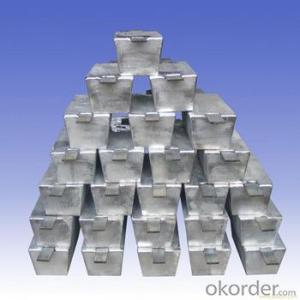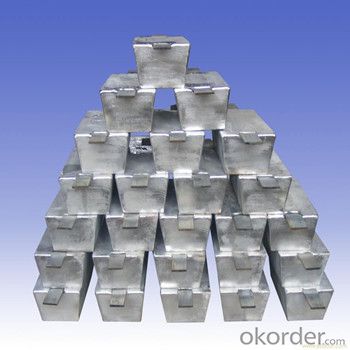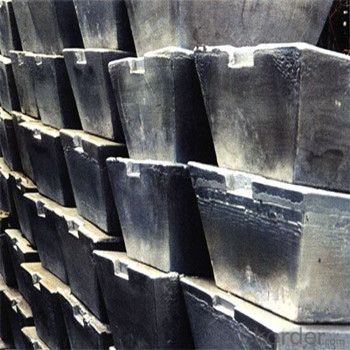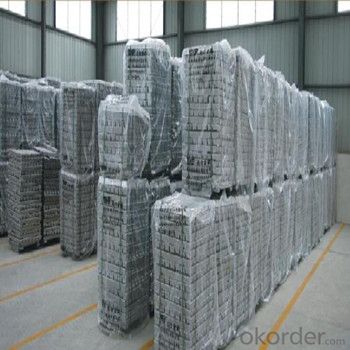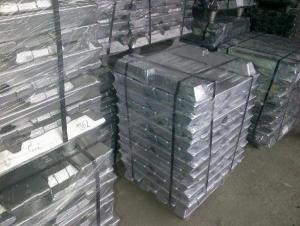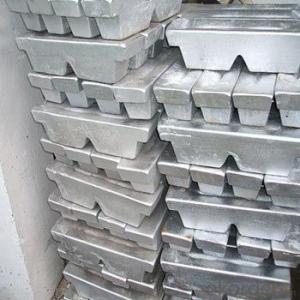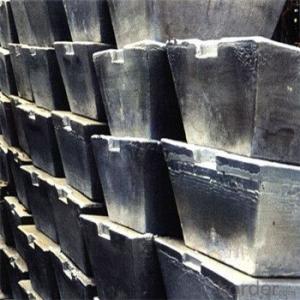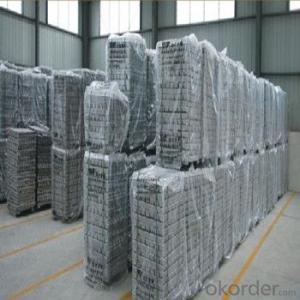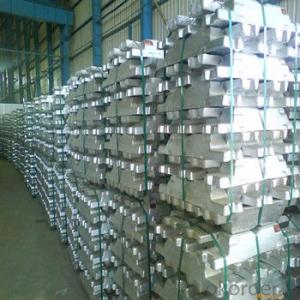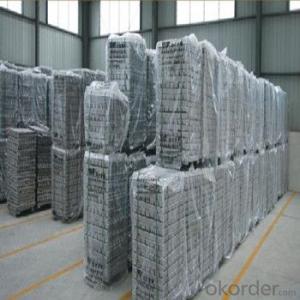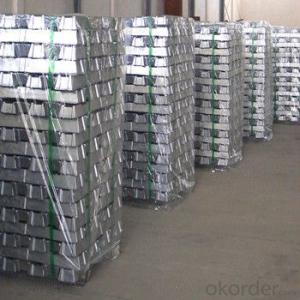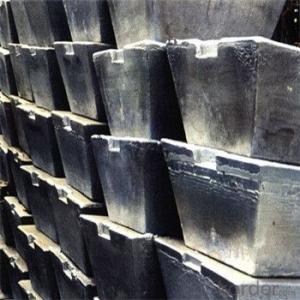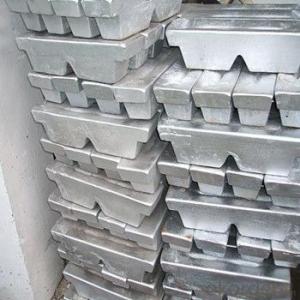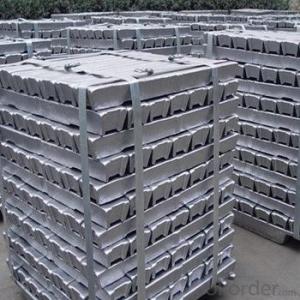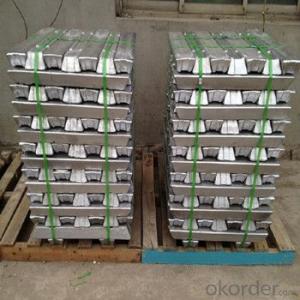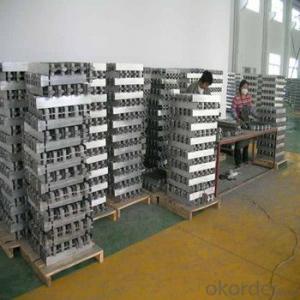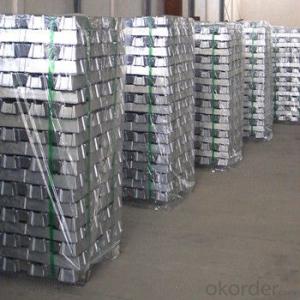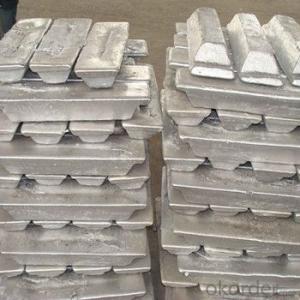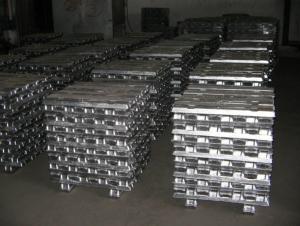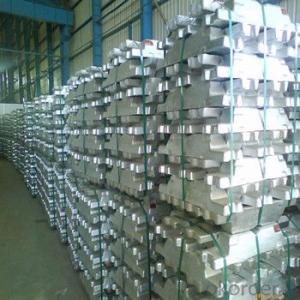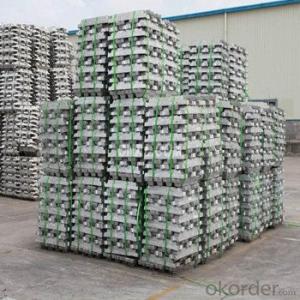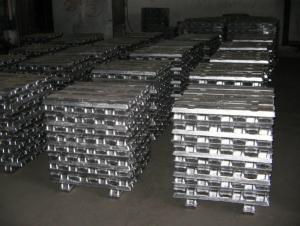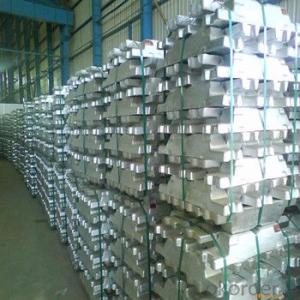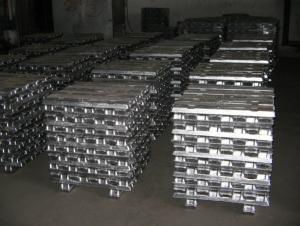Aluminum Pig/Ingot With High Quality From Mills
- Loading Port:
- China main port
- Payment Terms:
- TT OR LC
- Min Order Qty:
- 1000 m.t.
- Supply Capability:
- 100000 m.t./month
OKorder Service Pledge
OKorder Financial Service
You Might Also Like
Pure Aluminum Pig/Ingot Used for Industry
1.Structure of Aluminum Pig/Ingot
A material that has been cast into a shape in order to be transported and processed easier than in an unprocessed form. An ingot is typically rectangular in shape, which allows it to be stacked. Ingots are most commonly associated with metals, with ingots of gold held in the vaults of banks and brokerages being popular images.
Aluminum Ingot is with the AL as the main chemical composition.Aluminum Ingot is used for industry,such as automobile,pinning and weaving,electron broadly and so on. Aluminum Ingot has the following advantages: easy control and operation, fast melting.
2.Main Features of the Aluminum Pig/Ingot
•High Purity
•Easy control and operation
•High strength
•Fast melting
•Competitive price
•Best Service
3.Aluminum Pig/Ingot Images
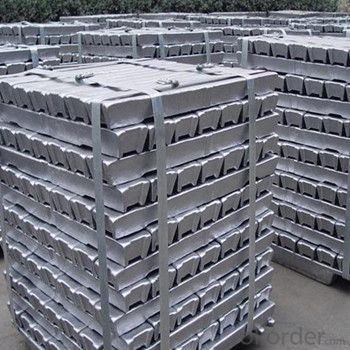
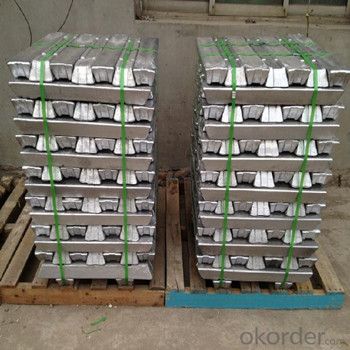
4.Aluminum Pig/Ingot Specification
Grade | Chemical Composition % | |||||||||
Al≥ | impurities ≤ | |||||||||
Si | Fe | Cu | Ga | Mg | Zn | Mn | others | Sum | ||
Al99.9 | 99.90 | 0.50 | 0.07 | 0.005 | 0.02 | 0.01 | 0.025 | - | 0.010 | 0.10 |
Al99.85 | 99.85 | 0.80 | 0.12 | 0.005 | 0.03 | 0.02 | 0.030 | - | 0.015 | 0.15 |
Al99.7 | 99.70 | 0.10 | 0.20 | 0.010 | 0.03 | 0.02 | 0.030 | - | 0.030 | 0.30 |
Al99.6 | 99.60 | 0.16 | 0.25 | 0.010 | 0.03 | 0.03 | 0.030 | - | 0.030 | 0.40 |
Al99.5 | 99.50 | 0.22 | 0.30 | 0.020 | 0.03 | 0.05 | 0.050 | - | 0.030 | 0.50 |
Al99.00 | 99.00 | 0.42 | 0.50 | 0.020 | 0.03 | 0.05 | 0.050 | - | 0.050 | 1.00 |
5.FAQ of Aluminum Pig/Ingot
We have organized several common questions for our clients,may help you sincerely:
①How about your company?
A professional factory which foucs on producing the aluminum pig,can meet customers' requiement to the quality and grade.The quality also have been accepted by customer.Already got the good reputation among the customers.It have gotten lot of much experience.The facrtory has the professional Technical Worker and the advanced equipments for production.Beside,it has the profesional teams to operate the whole proess for exporting.OEM service is availble and welcome.The items have beedn exported around the world,and have been acceptable among the customers,and have gotten the good reputation already.No matter from the quality,price and service,can be guaranteed for the cusgtomers.High purity and diffent grade are available.
②How to guarantee the quality of the products?
We have established the international advanced quality management system,every link from raw material to final product we have strict quality test;We resolutely put an end to unqualified products flowing into the market. At the same time, we will provide necessary follow-up service assurance.
③How long can we receive the prod rking days, We will arrange the factory delivery as soon as possible. The pecific time of receiving is related to the state and position of customers.Commonly 7 to 10 working days can be served.
- Q: Can aluminum ingots be used in the production of musical instruments?
- Yes, aluminum ingots can be used in the production of musical instruments. Aluminum is a lightweight and durable metal that can be molded into various shapes, making it suitable for the construction of instrument bodies, parts, and accessories.
- Q: Brief introduction of die casting aluminium ingot
- Application industry and field:1: field: alloy, casting, electronic2, application industry:Light industry, power, electrical, electronic, automotive, machinery manufacturing, construction, packaging and other industries1) in the construction industry, it has been widely applied because of the stability of aluminum in air and the excellent appearance after anodizing2) aluminum alloys are also widely used in the aviation and defense sector;3) in power transmission, aluminum cables are usually reinforced by high strength steel wires;4) kitchen utensils are the earliest use of aluminium, and there is still a vast market today.5) based on its chemical resistance, aluminum is particularly suitable for use in the manufacture and storage of chemicals.6) "aluminum" high affinity for oxygen, which are widely used for deoxidizing agent of iron and steel7) other: automobile manufacturing, container transport, daily necessities, household appliances, mechanical equipment, etc., need a lot of aluminum.
- Q: What type of spectrometer is used to analyze aluminium ingots?
- The spectrometer has many brands and many models, so you can't ask questions like that.
- Q: Can you melt the aluminium ingot?
- Cans and cans and rings are aluminium alloys with different compositions. The tank is made of aluminium alloy coil and punched out each plate first, and then the wafer is deep washed into a tank.
- Q: How much is a ton of aluminium ingot on the market?
- Anshan executive director and Secretary of the board of directors pay Kyrgyzstan will accept the inquiry said that Liaoning province is not affected by the snowstorm blowing, the Anshan Iron and steel production line is operating normally, although from Shanxi coal supply tensions, but from Heilongjiang normal supply, so the company can make proper deployment, to meet the needs. However, Fu Ji will say that the snow storm caused some traffic in the sales market to be confused and could not be paid on time.
- Q: How about aluminium material?
- In the aluminum industry for more than ten years, from bauxite to aluminum ingots, aluminum bars, profiles are relatively ripe.
- Q: Who knows, general aluminium ingot has those specifications?
- Several common aluminum ingotAluminum ingots for remelting --15kg (99.80%Al, 20kg):T shaped aluminum ingot --500kg, 1000kg (99.80%Al):High purity aluminium ingot --l0kg, 15kg (99.90% ~ 99.999%Al);Aluminium alloy ingots --10kg, 15kg (Al--Si, Al--Cu, Al--Mg);Slab --500 to 1000kg (for plate making);Round ingot --30 to 60kg (wire drawing).
- Q: What are the different heat treatment processes for aluminum ingots?
- There are several different heat treatment processes that can be applied to aluminum ingots to enhance their mechanical properties and overall performance. These processes include: 1. Annealing: This process involves heating the aluminum ingot to a specific temperature and then slowly cooling it down. Annealing helps to relieve internal stresses, improve ductility, and enhance machinability. 2. Solutionizing: Solutionizing, also known as homogenization, is a heat treatment process that involves heating the aluminum ingot to a high temperature to dissolve any precipitates or impurities. This process helps to create a more uniform microstructure and improve the alloy's mechanical properties. 3. Quenching: Quenching is a rapid cooling process that follows solutionizing. It involves immersing the aluminum ingot in a quenching medium, such as water or oil, to cool it down quickly. This process helps to lock in the desired microstructure and improve the alloy's strength and hardness. 4. Aging: Aging is a heat treatment process that follows solutionizing and quenching. It involves heating the aluminum ingot at a moderate temperature for a specific duration to allow for the precipitation of strengthening phases. Aging enhances the alloy's strength, hardness, and resistance to wear and corrosion. 5. Precipitation hardening: Precipitation hardening, also known as age hardening, is a combination of solutionizing, quenching, and aging. It involves heating the aluminum ingot to a high temperature to dissolve any precipitates, followed by rapid cooling and then aging at a lower temperature. This process helps to create a fine dispersion of precipitates within the alloy, resulting in improved strength and hardness. Overall, these heat treatment processes for aluminum ingots offer a range of benefits, including improved mechanical properties, enhanced machinability, and increased resistance to wear and corrosion. The specific treatment process used depends on the desired properties and application of the aluminum alloy.
- Q: What are the common uses of aluminum ingots?
- Aluminum ingots have a wide range of common uses due to their unique properties. One of the most common uses is in the manufacturing of various products in the automotive industry. Aluminum ingots are used to make engine components, such as cylinder heads and engine blocks, as well as body panels and wheels. The lightweight nature of aluminum makes it ideal for improving fuel efficiency and reducing vehicle weight. Another prominent use of aluminum ingots is in the construction industry. Aluminum is used to fabricate window frames, door frames, roofing materials, and structural elements. It is highly corrosion-resistant, which makes it suitable for outdoor applications. Additionally, its lightweight nature allows for easy installation and transportation. The packaging industry also heavily relies on aluminum ingots. Aluminum is used to make cans for beverages and food items due to its excellent barrier properties, which protect the contents from light, moisture, and air. Moreover, aluminum cans are easily recyclable, making them a sustainable choice. Aluminum ingots are also widely used in the electrical industry. They are utilized in the production of power transmission lines, electrical wiring, and conductors. Aluminum's high electrical conductivity and low weight make it an ideal material for conducting electricity efficiently and cost-effectively. Lastly, aluminum ingots find applications in the aerospace industry. The lightweight yet strong characteristics of aluminum make it an excellent choice for manufacturing aircraft components, including wings, fuselages, and structural parts. The weight reduction achieved with aluminum significantly improves fuel efficiency and overall performance. Overall, the common uses of aluminum ingots span across various industries, including automotive, construction, packaging, electrical, and aerospace. Its versatility, strength, and lightweight nature make it an essential material in modern manufacturing processes.
- Q: How are aluminum ingots shaped into different forms?
- Aluminum ingots are shaped into different forms through a process called extrusion. This involves heating the ingots to a specific temperature and then forcing the molten aluminum through a die, which determines the shape and size of the final product.
Send your message to us
Aluminum Pig/Ingot With High Quality From Mills
- Loading Port:
- China main port
- Payment Terms:
- TT OR LC
- Min Order Qty:
- 1000 m.t.
- Supply Capability:
- 100000 m.t./month
OKorder Service Pledge
OKorder Financial Service
Similar products
Hot products
Hot Searches
